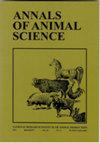Nutritional supplements for the control of avian coccidiosis
IF 2.2
4区 农林科学
Q2 AGRICULTURE, DAIRY & ANIMAL SCIENCE
引用次数: 0
Abstract
Abstract Coccidiosis is acclaimed as the most prevalent enteric parasitic ailment of poultry. It is caused by an apicomplexan protozoon of the genus Eimeria, which resides in chicken intestinal epithelium leading to intestinal damage. As a result, bloody droppings are there, feed efficiency is reduced, the growth rate is impaired, and egg production is temporarily decreased. Treatment and prevention of coccidiosis are primarily accomplished by inoculating live vaccines and administering anticoccidial drugs. Due to anticoccidials’ continuous and excessive use, the mounting issue is drug resistant Eimeria strains. The poultry industry has managed resistance-related issues by suggesting shuttle and rotation schemes. Furthermore, new drugs have also been developed and introduced, but it takes a long time and causes cost inflation in the poultry industry. Moreover, government disallows growth promoters and drugs at sub-therapeutic doses in poultry due to increased concerns about the drug residues in poultry products. These constraints have motivated scientists to work on alternative ways to control coccidiosis effectively, safely, and sustainably. Using nutritional supplements is a novel way to solve the constraints mentioned above. The intriguing aspects of using dietary supplements against coccidiosis are that they reduce the risk of drug-resistant pathogen strains, ensure healthy, nutritious poultry products, have less reliance on synthetic drugs, and are typically considered environmentally safe. Furthermore, they improve productivity, enhance nonspecific immunity, preventing oxidation of fats (acting as antioxidants) and inflammation (acting as an anti-inflammatory). The present manuscript focuses on the efficacy, possible mechanism of action, applications, and different facets of nutrition supplements (such as organic acids, minerals, vitamins, probiotics, essential oils, amino acids, dietary nucleotides, feed enzymes, and yeast derivatives) as feed additive for treating poultry coccidiosis.控制鸡球虫病的营养补充剂
摘要球虫病是家禽最常见的肠道寄生虫病。它是由一种属于艾美耳球虫属的顶端复合体原体引起的,这种原体存在于鸡肠上皮中,导致肠道损伤。结果,那里有带血的粪便,饲料效率降低,生长速度受损,鸡蛋产量暂时下降。球虫病的治疗和预防主要通过接种活疫苗和服用抗球虫药物来完成。由于抗球虫药物的持续和过度使用,越来越多的问题是耐药性艾美耳球虫菌株。家禽业通过提出穿梭和轮换计划来解决与抵抗相关的问题。此外,也开发和引进了新药,但这需要很长时间,并导致家禽业的成本膨胀。此外,由于对家禽产品中药物残留的担忧加剧,政府禁止在家禽中使用亚治疗剂量的生长促进剂和药物。这些限制促使科学家们研究有效、安全和可持续地控制球虫病的替代方法。使用营养补充剂是解决上述限制的一种新方法。使用膳食补充剂治疗球虫病的有趣之处在于,它们降低了耐药病原体菌株的风险,确保了健康、营养的家禽产品,减少了对合成药物的依赖,并且通常被认为是环境安全的。此外,它们还能提高生产力,增强非特异性免疫力,防止脂肪氧化(起抗氧化剂的作用)和炎症(起抗炎作用)。本文重点介绍了营养补充剂(如有机酸、矿物质、维生素、益生菌、精油、氨基酸、日粮核苷酸、饲料酶和酵母衍生物)作为饲料添加剂治疗鸡球虫病的功效、可能的作用机制、应用和不同方面。
本文章由计算机程序翻译,如有差异,请以英文原文为准。
求助全文
约1分钟内获得全文
求助全文
来源期刊

Annals of Animal Science
农林科学-奶制品与动物科学
CiteScore
4.00
自引率
5.30%
发文量
138
审稿时长
6-12 weeks
期刊介绍:
Annals of Animal Science accepts original papers and reviews from the different topics of animal science: genetic and farm animal breeding, the biology, physiology and reproduction of animals, animal nutrition and feedstuffs, environment, hygiene and animal production technology, quality of animal origin products, economics and the organization of animal production.
 求助内容:
求助内容: 应助结果提醒方式:
应助结果提醒方式:


